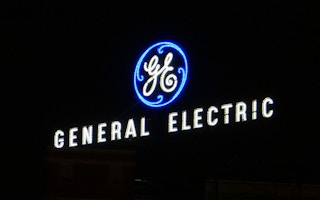An Australian non-profit said General Electric’s (GE) announcement that the American conglomerate, one of the world’s biggest makers of coal-fired power plants, would exit the new build coal market raises questions about coal ventures already in the pipeline.
To continue reading, subscribe to Eco‑Business.
There's something for everyone. We offer a range of subscription plans.
- Access our stories and receive our Insights Weekly newsletter with the free EB Member plan.
- Unlock unlimited access to our content and archive with EB Circle.
- Publish your content with EB Premium.
While the move, announced on 22 September, represents another nail in the coffin for the ailing coal sector, the company has yet to shed light on the fate of a total of 18 proposed coal power projects in 16 countries that would use its equipment, said Market Forces, which has been calling on banks and firms to ditch coal, in a press release.
“GE’s announcement is good news for the climate and for the company’s bottom line,” said Market Forces executive director Julien Vincent.
“The big question now is what happens to the raft of projects GE has on its books,” he observed. “Before GE gets too many plaudits for its move, there needs to be clarity on these 18 planned coal-fired power stations.”
The plants concerned—which are sited in Bangladesh, Indonesia, India, the Philippines and Vietnam, among others—are the equivalent of more than doubling Texas’ coal power capacity, and would add another 2.5 billion tonnes of carbon dioxide to the atmosphere over their lifetime, according to Market Forces.
Eco-Business has reached out to GE for comment.
The company said in a statement the exit “may” include divestitures, site closings as well as job cuts, but that it would “work on existing obligations”. Russell Stokes, GE’s senior vice president, indicated the company would keep servicing existing power plants.
“As we pursue this exit from the new build coal power market, we will continue to support our customers, helping them to keep their existing plants running in a cost-effective and efficient way,” he said.
The decision to pull out of the coal market comes as the acceptance of clean energy in the United States grows and follows several devastating years for the firm’s coal power business. Stokes said GE was “focused on power generation businesses that have attractive economics and growth trajectory”.
According to Market Forces, GE’s market capitalisation fell by 74 per cent between 2016 and 2018, with revenues for thermal equipment manufacturing down 22 per cent in 2018. In 2018 and 2019, GE’s power segment reported negative cash flows of US$2.3 billion and US$1.5 billion, respectively.
Vincent said GE’s failed venture into coal should serve as a cautionary tale for the remaining handful of corporations still in the business, such as Germany’s Siemens, Japan’s Toshiba and South Korea’s Doosan, which recently received a US$2 billion coronavirus bailout from the South Korean government.
It should also be a wakeup call for electronic giant Samsung, which recently announced its construction arm, Samsung C&T, could build the proposed Vung Ang 2 coal-fired power plant in Vietnam, prompting a campaign that highlights the environmental and social impact of the project.
“GE’s catastrophic foray into coal power should be a clear warning to others,” said Vincent. “Companies such as Samsung C&T should be wary of stepping in to pick up GE’s trash in projects such as Vung Ang 2. These projects have proven, time and again, to be bad news, not just for the climate, but for companies’ bottom line and brand.”
GE has been one of the engineering, procurement and construction contractors behind the Vung Ang 2 project and it has not disclosed whether its coal exit will see it withdraw from the controversial venture.
Over the years, the project has been repeatedly targeted by civil society groups for its potential to exacerbate air pollution and fuel climate change. A number of financial institutions including Standard Chartered Bank and OCBC Bank have pulled out of the venture, citing conflicts with tightened lending guidelines.
In March, an international coalition of 65 environmental groups from 16 nations launched a major new campaign against GE, urging the conglomerate to stop supplying equipment for the coal industry in their countries and align its business with the goals of the Paris climate deal.
GE’s announcement comes ahead of a presidential election in the United States, in which the rivals vying for the presidency hold starkly different views on fossil fuels, with incumbent Donald Trump championing “beautiful” coal and Joe Biden calling for tougher policies to fight global warming.








